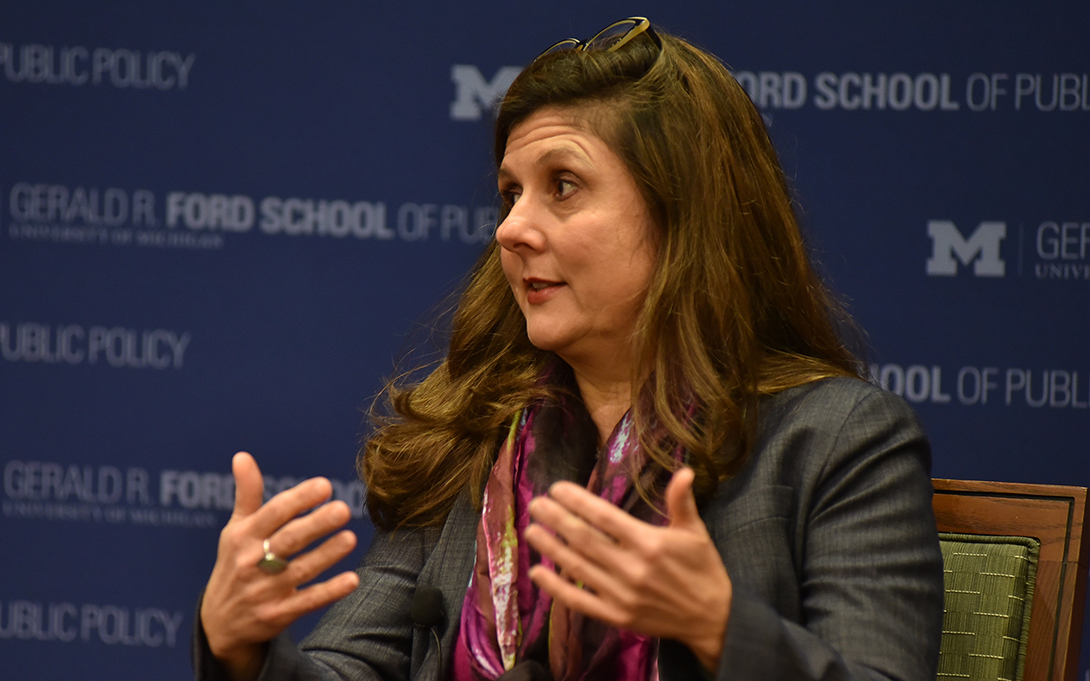
Ford School economics professor Betsey Stevenson is widely tapped for her comprehensive knowledge of the state of the U.S. economy.
When the debt ceiling deal was reached between President Biden and the GOP in Congress, she told NPR that the negotiations had set a bad precedent for future budget talks. “I think if you really want to think about the - what is the biggest cost of this brinksmanship, it's that it's a repeated game. I feel pretty confident that everybody in Congress now knows that this is a game worth playing. You get something for it. The Republicans got something. So I think we're going to see brinksmanship go on and on and on because we now know that this is a valuable leverage that can be used to negotiate.”
Speaking to BBC World Service about the size of the U.S. debt, she noted, “When we hear a number like 23 trillion…nobody knows what it means. One of the big tricks is that you have to scale it relative to something you understand. So when it comes to debt, the standard thing to do is to scale it to GDP… I think one of the reason people are worried about the UY.S. debt right now is that it has been growing as a share of the economy and that’s not a stable place for it to be.”
While the U.S. economy is doing well, Stevenson worried about other countries slipping into recession, and how that could affect the domestic scene. The U.S. wants other countries to stay out of recession because, “that makes it really easy for us to sell the things that we are best at creating around the globe.” she told Marketplace. If other countries do take a fall, the key is the strength of their labor markets. If those nations can recover quickly, “it can help make a U.S. recession less bad,” Stevenson said.
In a New York Times article, Why It Seems Everything We Knew About the Global Economy Is No Longer True, she is quoted on challenges to the reigning economic consensus. “We saw before the pandemic began that the wealthiest countries were getting frustrated by international trade, believing — whether correctly or not — that somehow this was hurting them, their jobs and standards of living.”
As the Fed was preparing its June interest rate decision, Stevenson appeared on Bloomberg Australia to discuss the most recent CPI report and preview that decision. “We know that bringing down inflation is not something that happens overnight. It happens slowly and we see it moving in the right direction. That’s the glass-half-full story. I do think there’s a glass-half-empty story here though, which is that we are bringing inflation down from 4% to 2% and what we’re seeing across a lot of indicators is that it is getting really sticky and we don’t have reason to believe that it’s going to come down easily.”
Commenting on raising the minimum wage, she told NPR there is a reason Congress hasn’t raised it. "Because the minimum wage has been raised all across the country at the state and local level. And so it's just not as much of a priority because it won't affect as many people as it would have 10 years ago."
Even so, Stevenson says there is strong public support for raising the minimum wage. But — another hurdle — lower-income Americans are far less likely to vote. She says they're hit disproportionately by voting restrictions and that casting a ballot can come at a cost.
"For some of us, giving up a day's worth of work to stand in a line to vote could mean not being able to pay your rent, or not eat," Stevenson says.
The debt ceiling deal that was passed last week poses new challenges for the economy, NPR, June 10, 2023
These millionaires want to tax the rich, and they're lobbying working-class voters. NPR, June 13, 2023
Professor Betsey Stevenson Previews Fed Decision, Bloomberg Australia, June 13, 2023
Why It Seems Everything We Knew About the Global Economy Is No Longer True, The New York Times, June 18, 2023
Other countries are tipping into recession — and could drag the U.S. along, Marketplace, June 20, 2023
US National Debt: is $32 trillion a big number?, BBC World Service, June 24, 2023

